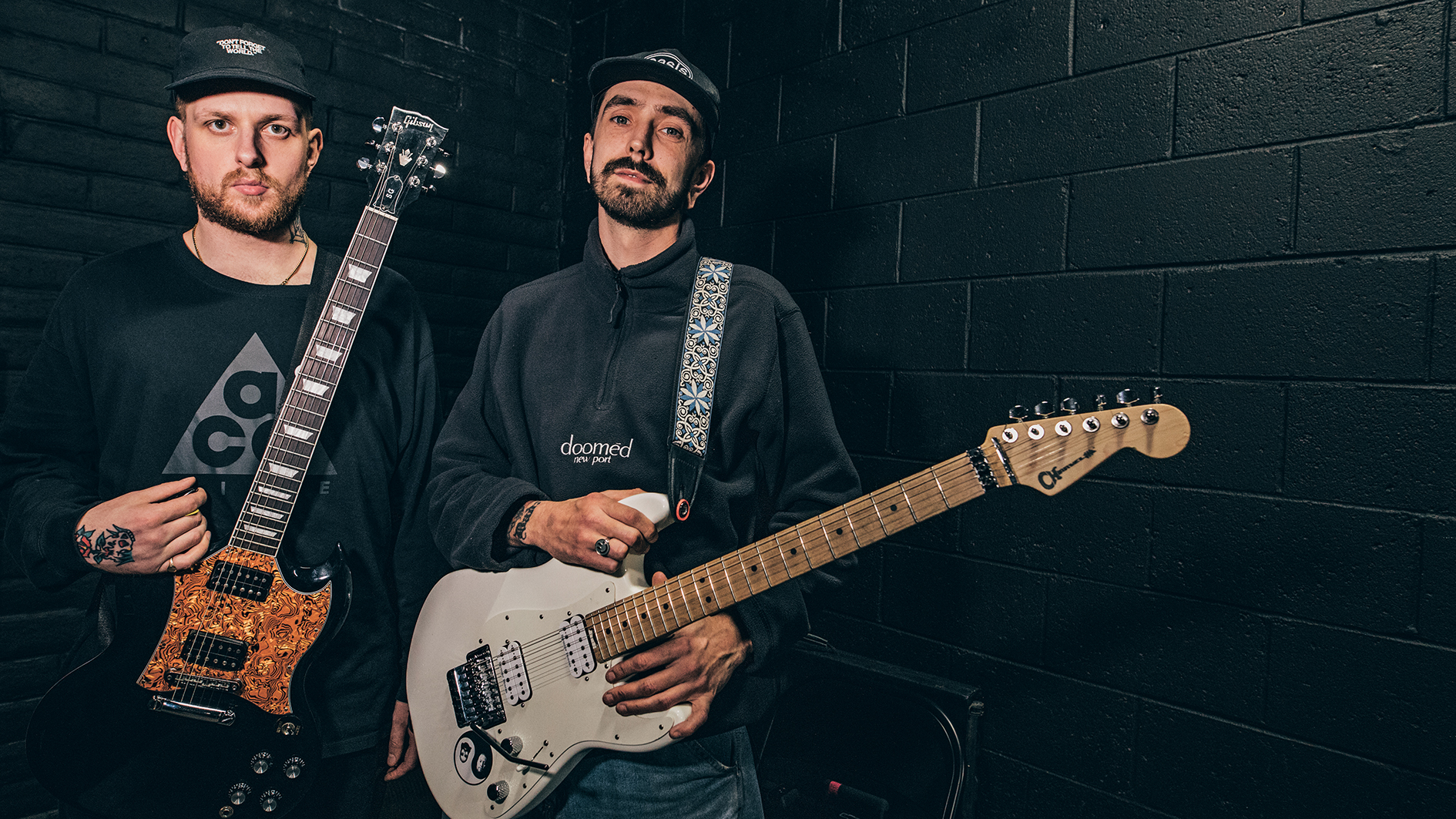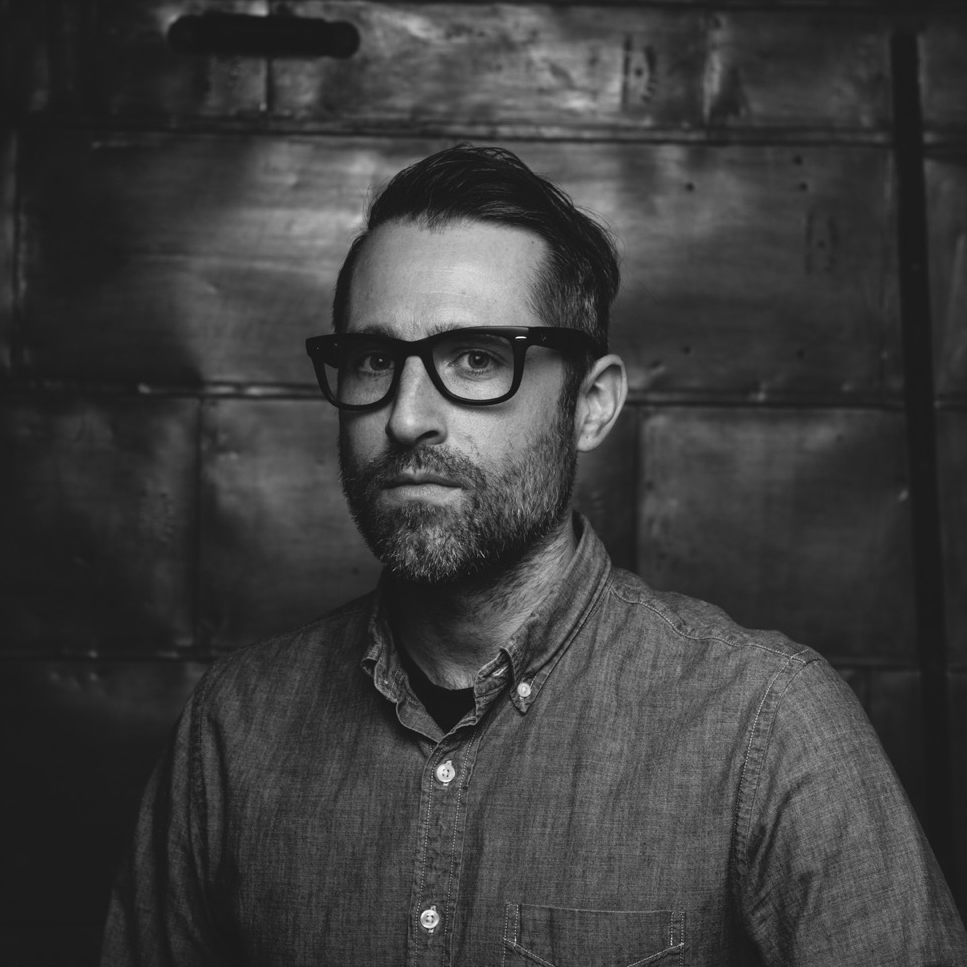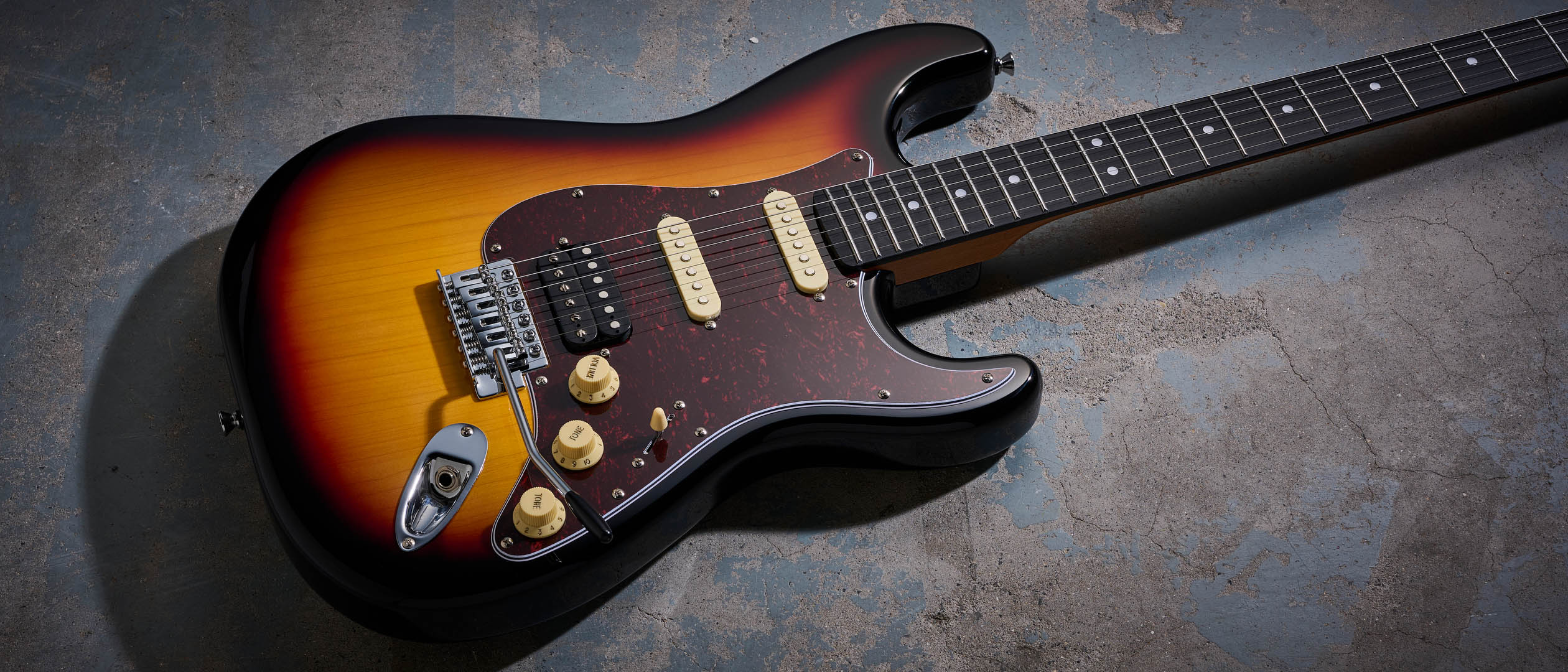Higher Power: "You can pull guitar ideas from anywhere - even grime music"
Louis Hardy and Max Harper talk 27 Miles Underwater, the second outing by the UK hardcore squad. But wait - are they really hardcore?

“We come from hardcore, but I don’t think of us as a hardcore band,” says Higher Power guitarist Louis Hardy. “I don’t listen to it and think this sounds like hardcore music. I just think of it as a rock band.”
One spin of the Leeds, England-based crew’s excellent new sophomore record, 27 Miles Underwater, and you’ll immediately hear what Hardy is talking about - and why their genre-defying sound has made Higher Power one of the most exciting new acts in hardcore punk.
Take opener Seamless, for example, which kicks off with a crushing, groove-heavy riff and seething vocals before transitioning into a massive, dreamy Deftones-meets-Jane’s Addiction chorus.
Higher Power explore this hook-filled, crossover sound throughout the album’s remaining 10 cuts - pushing the boundaries of traditional hardcore while staying firmly true to its spirit.
“Because [our] approach to writing catchy rock songs comes from a DIY hardcore mentality, it has a lot more integrity than just sitting down and [saying], ‘Let’s produce a big pop song... a catchy song that means nothing,’” Hardy says.
“We’re so heavily invested, emotionally, and we’ve sacrificed so much to make the band work... The passion for it... everyone is living it.” And if Higher Power’s current trajectory is any indication, the band - which also features singer Jimmy Wizard and his brother, drummer Alex, bassist Ethan Wilkinson and guitarist Max Harper - is on the verge of living larger than they’d ever imagined.
After self-releasing their 2017 debut, Soul Structure, Higher Power caught the attention of Roadrunner Records, which signed them and released 27 Miles Underwater this past January.
Get The Pick Newsletter
All the latest guitar news, interviews, lessons, reviews, deals and more, direct to your inbox!
I never thought I’d even get to go to America. I’d never even left the country before I started touring
Louis Hardy
Their major-label debut garnered widespread praise from critics and fans alike, with Billboard including Higher Power in their staff-picked Best Alt & Rock Songs list and Revolver’s metal fans voting them the top act most likely to break out in 2020.
But today, as Guitar World sits down with Harper and Hardy at a noodle shop in Williamsburg, Brooklyn, the two are focused on more immediate concerns: namely, finishing their seitan and vegetable plates so they can throw down at tonight’s sold-out show at nearby venue Union Pool.
While this isn’t the first time Higher Power have toured the US, it is the first time they’ve headlined - something unfathomable for these twentysomethings just a few short years ago.
“I never thought I’d even get to go to America. I’d never even left the country before I started touring,” Hardy says. “You feel like you’re in a movie. The first time I came it was very surreal. You grow up watching American movies and absorbing American culture and media... It’s like this other world.”
“Our whole slogan, ‘Where the freaks at?’, caught on, and the people are into that now,” Harper adds, in between bites. “The first couple of tours people were just kinda figuring us out. Now people get it here. People understand us more in America now than they do in Europe.”
Higher Power’s international expansion is all the more remarkable when you consider that the band was never supposed to exist outside of Leeds’ tight-knit hardcore community.
Back in 2014, Jimmy and Alex Wizard wanted to take a break from their main bands and explore a studio-only project that evoked New York crossover hardcore acts Merauder and Leeway. Hardy, who was in another local band, Blind Authority, with Alex, was asked to play guitar on the demo.
Basically me and Ethan just bullied ourselves into the band [laughs]
Max Harper
Immediately upon hearing it, fellow scene members Harper and Wilkinson knew they had to be involved. “Jimmy recorded it and didn’t want to put it out,” Harper says. “They only wanted to keep it as a low-key side-project thing. But then Ethan heard it, and he was like, ‘I want to play bass.’ Basically me and Ethan just bullied ourselves into the band. [Laughs] It was just too good.”
With Jimmy Wizard convinced and the lineup secured, things started moving quickly. 2015’s three-song demo was soon followed by the Space to Breathe 7-inch, and the next year the group headed to the U.S. to play a string of dates leading up to Richmond, Virginia’s long-running United Blood Fest, a raucous show that Harper recalls as being “the most surreal thing I’d ever experienced.”
While 2017’s Soul Structure hinted at the band’s ambition and the guitarists’ fresh take on hardcore - it’s on 27 Miles Underwater that they fully realized their vision and leveled up their songwriting. Higher Power teamed with noted alt-rock producer Gil Norton (Pixies, Foo Fighters, Jimmy Eat World) for the new record.
And while they arrived at Modern World Studios in Tetbury, England, with the song ideas pretty much sorted out, Harper credits Norton with helping the band refine and finesse the material and “make songs bigger than what we were making them.”
Hardy adds that Norton also taught the band “how to listen to each other in a musical way,” which resulted in a noticeable uptick in each musician’s creative output.
“Obviously hardcore is our bread and butter,” he continues, “but the parameters of a typical hardcore band, musically, are quite narrow: fast, heavy, powerchords... We never sat down and said, ‘Let’s make a band where we’ll experiment.’ But we’re all very open-minded about developing as musicians and progressing and thinking outside the box a bit.”
For Hardy and Harper, the roots of their artistic open-mindedness stretch back to when they were kids, growing up with music-loving parents and their eclectic record collections.
I was like, ‘This is boring, I don’t want to do this. It was one of my biggest mistakes! I love doing scales now!
Max Harper
“My mom and dad were bikers, so I grew up around rock music and going to rallies and seeing bands,” says Harper, who was raised south of Leeds in the small town of Shirebrook. “But they were also nurses, as well, so they would have lodgers who were training [as] nurses, and a lot of them were also musicians and they had their own guitars. I always had an interest.”
Harper scoured his parents’ collection of Metallica, Maiden and classic rock, and explored British mod bands like the Jam and Quadrophenia-era Who (which taught him about “all the like nicer chords and pentatonic scales”), before eventually graduating to heavier hardcore acts like Earth Crisis, Drop Dead, Integrity, Black Flag, Fugazi and Agnostic Front.
Harper took guitar lessons for over a year but ultimately grew restless with the formal approach to learning lead. “I was like, ‘This is boring, I don’t want to do this,’” he recalls.
“It was one of my biggest mistakes! I love doing scales now!” Instead he stuck to “a lot of rhythm” and studied other players’ techniques. One artist, in particular, inspired the young guitarist to add a bit of controlled musical chaos to the mix: Rage Against the Machine’s Tom Morello.
“I watched an interview with him where he goes over his techniques, I think before Rage got massive,” he remembers. “He’d do eight hours of practice a day: two hours of theory, two hours of playing, two hours of listening to other people’s music, and then two hours of freestyle where he would play anything and just jam...
"I think that’s why I like using [my current] Charvel San Dimas, because of the whammy setup and being able to make crazy noises.”
Hardy grew up 30 miles south of Harper in Nottingham, with a drummer father who loved '90s hip-hop like Biggie and Tupac and a punk mother who weaned him on a diet of Bad Brains, Dead Kennedys and the Clash.
The young musician was first drawn to playing bass (“I learned the slap style when I was a kid; I used to love Jaco Pastorious”), but eventually gravitated to the guitar as a means to write songs.
Even grime music - the rhythms are jagged and jarring and you take those notes and play them as power chords and it’s a heavy breakdown. You can pull ideas from anywhere
Louis Hardy
Like Harper, he also developed a fascination with “out of the box” players like Morello and Limp Bizkit’s Wes Borland, “players that aren’t like, ‘Oh, I’m a virtuoso... I can shred really fast, it’s all about how good I am.’ It’s more about creating a cool sound and a cool texture, to add some interesting thing to a song.”
Both guitarists brought this adventurous songwriting spirit to 27 Miles Underwater - a quality that allowed them to draw inspiration from diverse sources and filter it through the lens of hardcore.
A prime example is the aforementioned Seamless, which Hardy says was inspired by Soundgarden’s 1991 burner Jesus Christ Pose. “I just played it faster and changed the rhythm a bit and that was the Seamless riff,” he reveals.
“Obviously [Jesus Christ Pose] is not a hardcore song, but you can take a melodic idea or rhythm... even like grime [electronic] music - the rhythms are jagged and jarring and you take those notes and play them as power chords and it’s a heavy breakdown. You can pull ideas from anywhere.”
Elsewhere, like Rewire (101) and Lost in Static, the pair play around with chord voicings to add some color. “Typically, hardcore is all power chords,” Hardy says, “so we maybe add a jazz chord or 7th or 4th, different notes to rephrase what would have been a power chord...
"Then one of us will play a power chord and the other will play a different shape to make it richer and texturally thicker.”
Higher Power’s boundary-pushing approach to songwriting keeps things interesting throughout 27 Miles Underwater, which also includes strummy acoustic ballads (In the Meantime), noisy excursions (Staring at the Sun), straight-up Alice in Chains moments (on the Rooster-esque intro to Self-Rendered: Lost) and irreverent punk solos, the latter of which Hardy creates in King of My Domain.
[Being in a band] got me to travel the world, make new friends, develop as a human being and as a musician. It literally changed my life
Louis Hardy
“Normally the solo would be in the middle eight,” says the guitarist, whose main setup is a Gibson SG 2019, tuned a half-step down to D# Standard, into a Peavey 6505+. “I was like, ‘Let’s just put the solo in the verse. It’s so dumb, no one does that!’ It’s not common, so it’d be funny.
"Initially Gil wanted to take it out, like, ‘Why’d you do that?’ We were like, ‘Because people don’t do that. Let’s do it!’” Clearly Higher Power are all about bucking conventions - and having the most fun possible while they’re doing it. But they’re also dead serious about their craft and connection to the hardcore community at large.
And this commitment, which they display at each riotous live show, is gaining them new converts each night.
“Every day we’re doing shit, it’s not like a joke,” Hardy says. “It’s so serious and important... I feel people see the band, and they’re like, It’s real. It’s real music and not manufactured shit. Because it means so much to us. It got me to travel the world, make new friends, develop as a human being and as a musician. It literally changed my life.”
Brad is a Brooklyn-based writer, editor and video producer. He is the former content director of Revolver magazine and executive editor of Guitar World. His work has appeared in Vice, Guitar Aficionado, Inked and more. He’s also a die-hard Les Paul player who wishes he never sold his 1987 Marshall Silver Jubilee half stack.
“My guitar tech ran in and said, ‘Hey, you want to meet Pete?’ I was too scared”: The Smithereens’ love affair with The Who goes way back – yet when guitarist Jim Babjak got the chance to meet Pete Townshend, he turned it down
“Every tour was the best I could have done. It was only after that I would listen to more Grateful Dead and realize I hadn’t come close”: John Mayer and Bob Weir reflect on 10 years of Dead & Company – and why the Sphere forced them to reassess everything


![John Mayer and Bob Weir [left] of Dead & Company photographed against a grey background. Mayer wears a blue overshirt and has his signature Silver Sky on his shoulder. Weir wears grey and a bolo tie.](https://cdn.mos.cms.futurecdn.net/C6niSAybzVCHoYcpJ8ZZgE.jpg)

![A black-and-white action shot of Sergeant Thunderhoof perform live: [from left] Mark Sayer, Dan Flitcroft, Jim Camp and Josh Gallop](https://cdn.mos.cms.futurecdn.net/am3UhJbsxAE239XRRZ8zC8.jpg)






